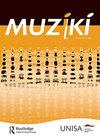Close to a Century of Popular Music Practices and Experiences in Nigeria (1922–2020) and a Brief History of Their Socio-political Background
IF 0.8
0 MUSIC
引用次数: 1
Abstract
Abstract For 98 years (1922–2020), the entire corpus of popular music practices and experiences in Nigeria evolved and thrived almost uninterrupted until the great disruption caused when the World Health Organization (WHO) declared Severe Acute Respiratory Syndrome Coronavirus 2 (COVID-19) a global pandemic on 11 March 2020. Between 1922 and 2020, there have been hazy and unsteady creative attempts, incipient interactions and interruptions, generational changes and exchanges, and ideological shifts which have marked the evolution of Nigerian popular music. Based on a historical-analytical approach, this article reports on a study that aimed to recollect and explore the remarkable socio-political developments, transformations and perceptions that have consistently underpinned these 98 years of popular music practices/experiences in Nigeria. As part of the study findings, these years were divided into the following four periods: the foggy years (1922–1944); the interactive-budding period (1945–1969); the liberal period (1970–1999); and the mononationalist period (2000–2020). In part, the methodology relied on the oral accounts of some elderly and middle-aged Nigerian popular music artists, entrepreneurs, enthusiasts and analysts, as well as archival resources (print and audio-visual), and the extant literature on popular music in and social history of Nigeria. The findings also revealed transnational heritages and memorial continuities that partly and presently characterise these periods.尼日利亚近一个世纪的流行音乐实践和经验(1922–2020)及其社会政治背景简史
摘要98年来(1922年-2020年),尼日利亚的整个流行音乐实践和经验几乎不间断地发展和繁荣,直到2020年3月11日世界卫生组织(世界卫生组织)宣布严重急性呼吸综合征冠状病毒2(新冠肺炎)为全球大流行时造成了巨大的破坏。1922年至2020年间,尼日利亚流行音乐发生了模糊和不稳定的创作尝试、初期的互动和中断、代际变化和交流以及意识形态转变。基于历史分析方法,本文报告了一项研究,旨在回顾和探索尼日利亚98年流行音乐实践/经历的显著社会政治发展、变革和观念。作为研究结果的一部分,这些年被分为以下四个时期:雾年(1922–1944);互动萌芽期(1945-1969);自由主义时期(1970年至1999年);以及单一民族主义时期(2000-2002年)。在一定程度上,该方法依赖于一些尼日利亚中老年流行音乐艺术家、企业家、爱好者和分析人士的口头描述,以及档案资源(印刷品和音像),以及尼日利亚流行音乐和社会史的现存文献。研究结果还揭示了跨国遗产和纪念馆的连续性,这在一定程度上和目前是这些时期的特征。
本文章由计算机程序翻译,如有差异,请以英文原文为准。
求助全文
约1分钟内获得全文
求助全文

 求助内容:
求助内容: 应助结果提醒方式:
应助结果提醒方式:


